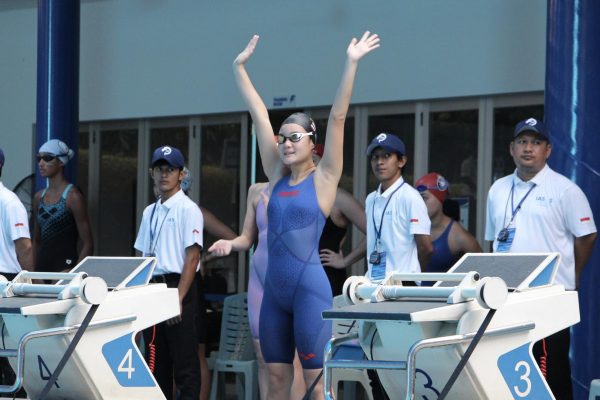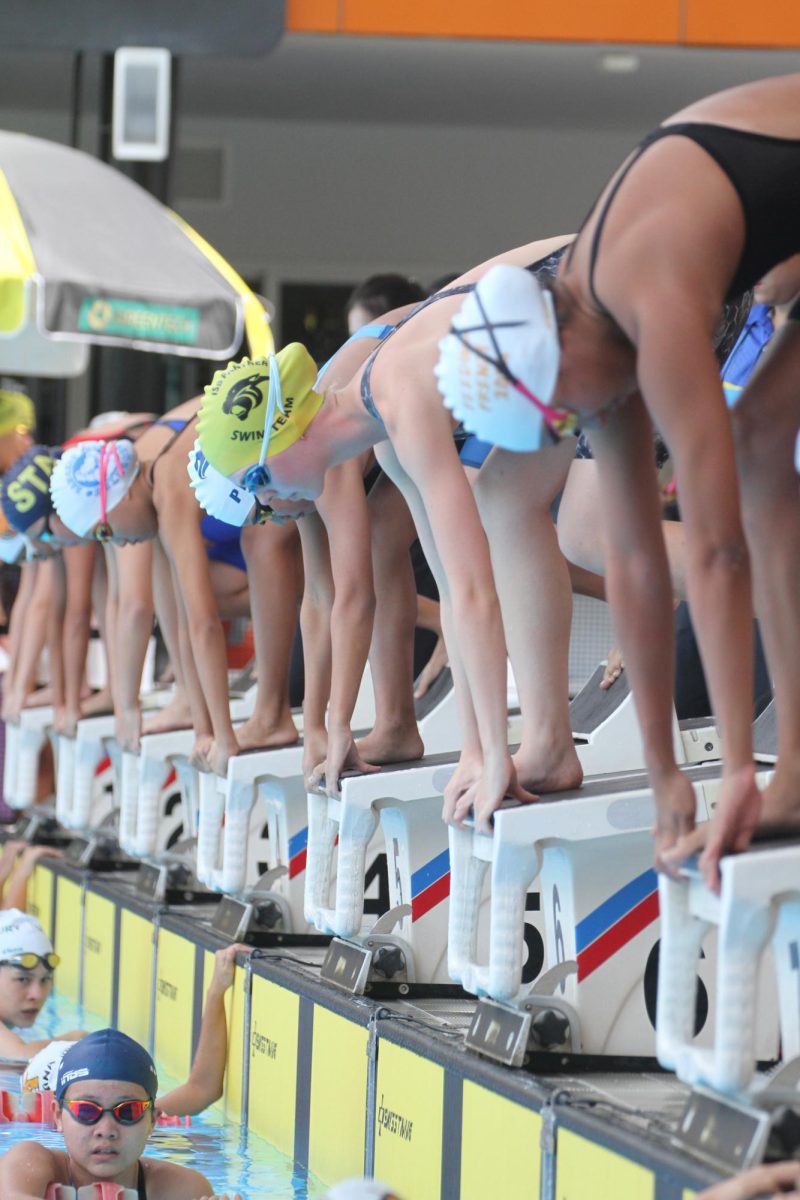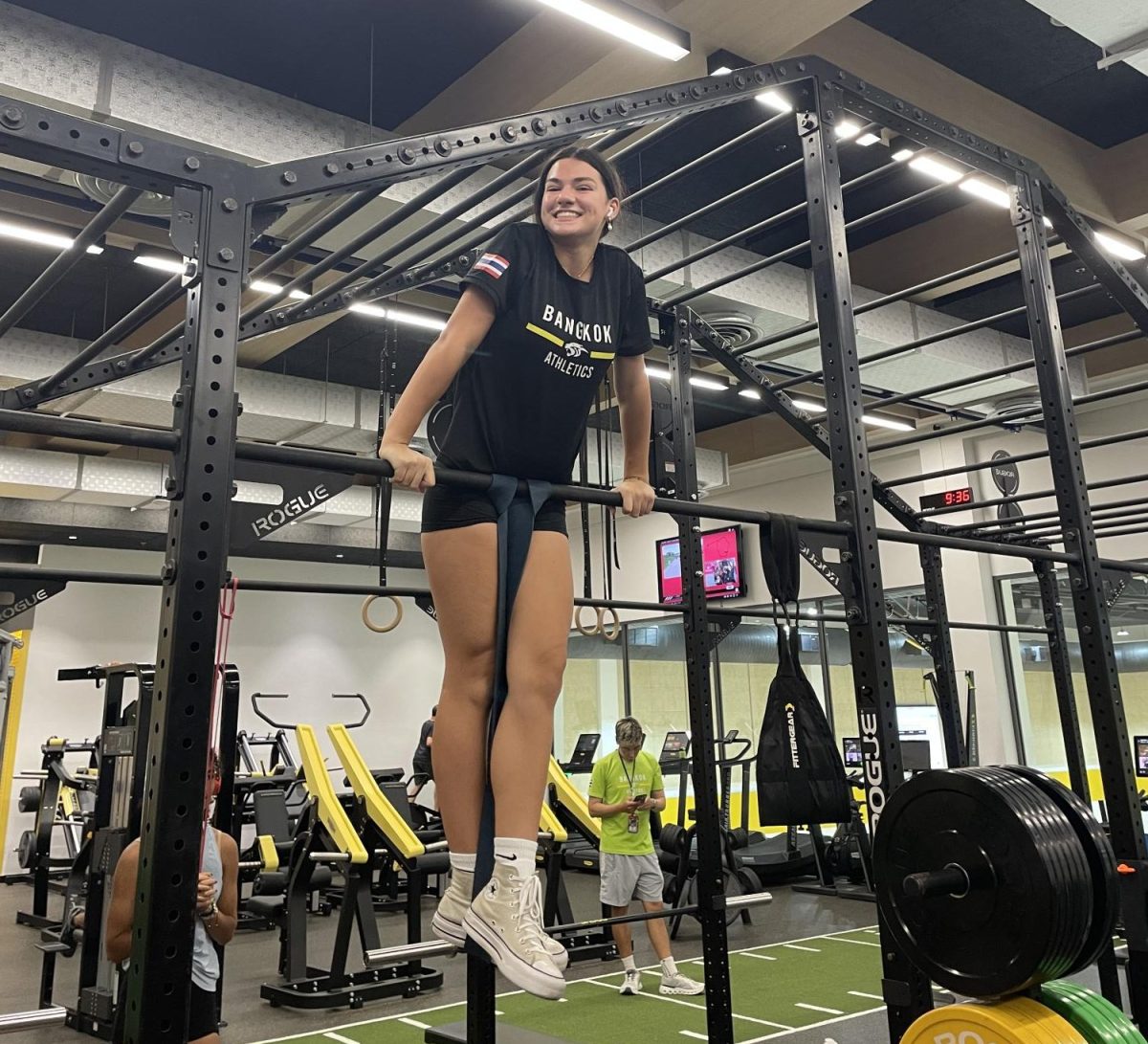IASAS Swimming, 2024-Jakarta
I stand at the side of the pool, watching swimmers race down its length. The deck is small, with barely room between bleachers and the pool, the cramped space filled with the cheers of parents and teammates. The race ends, marshaling for the next event starting–I’m there just as my event, 100 fly, is called, and warm up quietly in front of the white plastic chairs that sit behind the blocks.
This is it, this is it, this is it.
Goggles on, headphones off, my heat is called to the blocks, and I take one last shaky breath.
Take your mark.
Splash.
Added: +1.28
I first heard of (more really understood) sports psychology a little after last year’s IASAS. I had heard of it before but had never been able to directly apply it to something I had done. What I learned during one brief afternoon in the Rajendra is that an athlete’s mentality has a significant impact on their athletic performance. Suddenly my IASAS 100 fly made sense — while I still made finals and PB’d in the afternoon, that first preliminary swim quickly became a stark example of what it meant to need a strong mental mindset.
Oxford Reference defines mental toughness as “a refusal to be intimidated, a determination to finish a contest, and an ability to control emotions and remain highly focused.” Mental toughness (or mental readiness, state, mindset) was first studied in 1925 by Coleman Griffith, an American sports psychologist considered the founding father of the field, and has since grown into a highly relevant, highly researched field. A study published by Palash Pramanik and Sridip Chatterjee found that focusing on improving skills can help athletes reach performance potential, such as overcoming fatigue and pain, regulating stress and fear, and adjusting motivational thinking and self-attitude.
Varsity Swim Coach Corry Day shares his thoughts on this.
“I would say that it comes in two forms: You have to be able to repeat training at a very, very high level, and that’s hard to do,” Day explains. “And then you have the mental toughness that comes in competitions. No matter what’s going on around you, you can block it out. You have to have a combination of both.”
Day says mental toughness can be complicated and that some athletes can “choke” come race day.
“Our meets that mean nothing, our swimmers that mentally struggle, do better,” he says. “We get to IASAS. It’s such a big stage for us, and that’s where people struggle. We have lots of high-level, high school athletes that choke — for lack of a better word — because the moment gets too big for them.”
Speaking from experience, Coach Day’s interpretation of big meets and meets that mean almost nothing is completely accurate. Our small, after-school, intrasquad meets give me close to no stress — simply because I know that, in the end, this isn’t going to determine the course of my swim season.
Coach Day outlines the steps for being mentally prepared and avoiding choke-hold stress at bigger meets like IASAS.
“So the easy low-hanging fruit one is just to block everything else out, so we’ll talk about music a lot, just getting in the zone so that you feel prepared, and that’s step 1,” he explains. “Step 2 would be literally rehearsing your race over and over and over again in your head so that there are no surprises. You’ve already acted this out multiple times.”
Strategies such as meditation, visualization, and rehearsal all all highlight the importance of positive thinking.
“You don’t think about adding five seconds to your PB, you think about [the race] being absolutely perfect. A lot of it is going to be on your own,” he says.
Sophomore Varsity Swimmer Shin Shin Yan, says that part of what mental toughness means to her is simply being “ok with whatever outcome you have.”
“I think that swimming is more of a mental game in the last 50 to 100 meters,” she continues. “I think that it’s important.”

Her teammate, Noon Jarupongrapa, says that reminding herself of all the things she’s done to prepare is a frequent strategy she uses before a race.
“It’s not that big of a deal. There’s going to be other chances…it’s just one race.”
But what many don’t consider when hearing about mental toughness and psychological preparation is the danger of over preparing and over thinking.
“There has been a huge difference in my performance when I’m overthinking and when I’m just taking it a step at a time,” Noon says. And she’s not wrong; an article from Kindbridge found that overthinking, anxiety, and stress can all be good and beneficial to athletes, but are often factors that reach the point where they’re no longer helpful, and instead impact self confidence and concentration.
“I’ve seen this in the eighth and ninth graders a lot,” Senior Swim Captain Bente Geraets says. “Even at small home meets people feel a lot of pressure, but it’s more pressure they put on themselves because they are younger.” Younger swimmers tend to fall victim to unhealthy stress, a concept Bente further explored in her IB Extended Essay.

“My EE had a focus on pre-competitive anxiety and their effects on a person’s swim performance,” Bente says, “so how fast they go — and this is like how far they are from their PB, if they’re swimming slower or faster than their best time.”
What her results found was that the performance anxiety-athletic performance relationship presented itself on a curve known as the Inverted-U Theory. The Inverted U-Theory shows stress level in correlation to athletic performance where having low stress leads to a low performance, some stress to a strong performance, and lots of stress to a poor performance.
“You want some anxiety, you want some stress,” Bente notes, “because if you don’t, then you don’t care enough about the race.”
Mental toughness and preparation is a huge factor in athletic performance — and one that’s often given a backseat to physical training. So the next time you’re stressing about a race or a game, take a step back, block out the crowds, and take a moment to visualize, a second to breathe, and focus.















